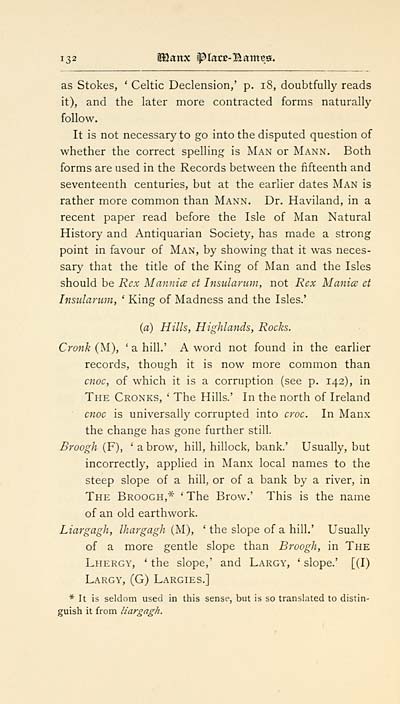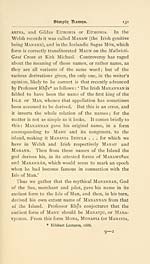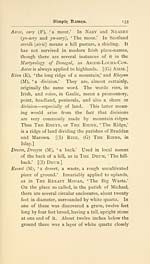Download files
Complete book:
Individual page:
Thumbnail gallery: Grid view | List view

132 IRanx place- ItantGS.
as Stokes, ' Celtic Declension,' p. i8, doubtfully reads
it), and the later more contracted forms naturally
follow.
It is not necessary to go into the disputed question of
whether the correct spelling is Man or Mann. Both
forms are used in the Records between the fifteenth and
seventeenth centuries, but at the earlier dates Man is
rather more common than Mann. Dr. Haviland, in a
recent paper read before the Isle of Man Natural
History and Antiquarian Society, has made a strong
point in favour of Man, by showing that it was neces-
sary that the title of the King of Man and the Isles
should be Rex Mannice ct Insularum, not Rex Manice et
(a) Hills, Highlands, Rocks.
Cronk (M), ' a hill.' A word not found in the earlier
records, though it is now more common than
cnoc, of which it is a corruption (see p. 142), in
The Cronks, ' The Hills.' In the north of Ireland
cnoc is universally corrupted into croc. In Manx
the change has gone further still.
Broogh (F), ' a brow, hill, hillock, bank.' Usually, but
incorrectly, applied in Manx local names to the
steep slope of a hill, or of a bank by a river, in
The Broogh,"^ 'The Brow.' This is the name
of an old earthwork.
Liargagh, Ihargagh (M), ' the slope of a hill.' Usually
of a more gentle slope than Broogh, in The
Lhergy, ' the slope,' and Largy, ' slope.' [(I)
Largy, (G) Largies.]
* It is seldom used in tiiis sense, but is so translated to distin-
guish it from liargagh.
as Stokes, ' Celtic Declension,' p. i8, doubtfully reads
it), and the later more contracted forms naturally
follow.
It is not necessary to go into the disputed question of
whether the correct spelling is Man or Mann. Both
forms are used in the Records between the fifteenth and
seventeenth centuries, but at the earlier dates Man is
rather more common than Mann. Dr. Haviland, in a
recent paper read before the Isle of Man Natural
History and Antiquarian Society, has made a strong
point in favour of Man, by showing that it was neces-
sary that the title of the King of Man and the Isles
should be Rex Mannice ct Insularum, not Rex Manice et
(a) Hills, Highlands, Rocks.
Cronk (M), ' a hill.' A word not found in the earlier
records, though it is now more common than
cnoc, of which it is a corruption (see p. 142), in
The Cronks, ' The Hills.' In the north of Ireland
cnoc is universally corrupted into croc. In Manx
the change has gone further still.
Broogh (F), ' a brow, hill, hillock, bank.' Usually, but
incorrectly, applied in Manx local names to the
steep slope of a hill, or of a bank by a river, in
The Broogh,"^ 'The Brow.' This is the name
of an old earthwork.
Liargagh, Ihargagh (M), ' the slope of a hill.' Usually
of a more gentle slope than Broogh, in The
Lhergy, ' the slope,' and Largy, ' slope.' [(I)
Largy, (G) Largies.]
* It is seldom used in tiiis sense, but is so translated to distin-
guish it from liargagh.
Set display mode to: Large image | Transcription
Images and transcriptions on this page, including medium image downloads, may be used under the Creative Commons Attribution 4.0 International Licence unless otherwise stated. ![]()
| Early Gaelic Book Collections > Blair Collection > Surnames & place-names of the Isle of Man > (150) |
|---|
| Permanent URL | https://digital.nls.uk/82101448 |
|---|
| Description | A selection of books from a collection of more than 500 titles, mostly on religious and literary topics. Also includes some material dealing with other Celtic languages and societies. Collection created towards the end of the 19th century by Lady Evelyn Stewart Murray. |
|---|
| Description | Selected items from five 'Special and Named Printed Collections'. Includes books in Gaelic and other Celtic languages, works about the Gaels, their languages, literature, culture and history. |
|---|

